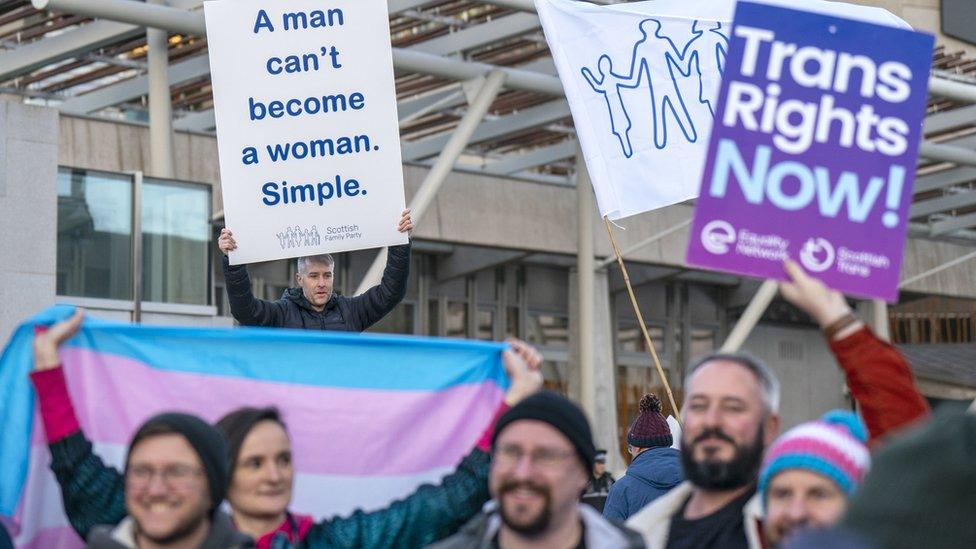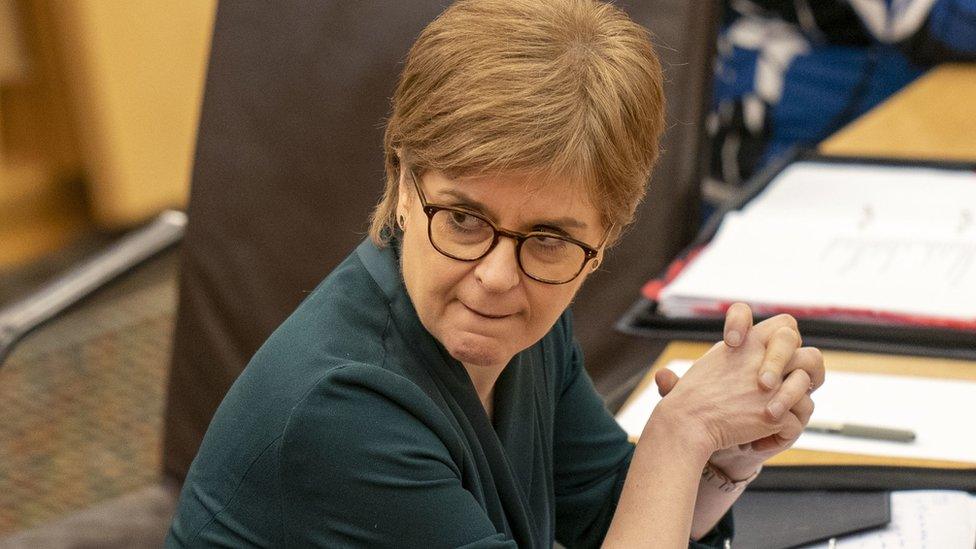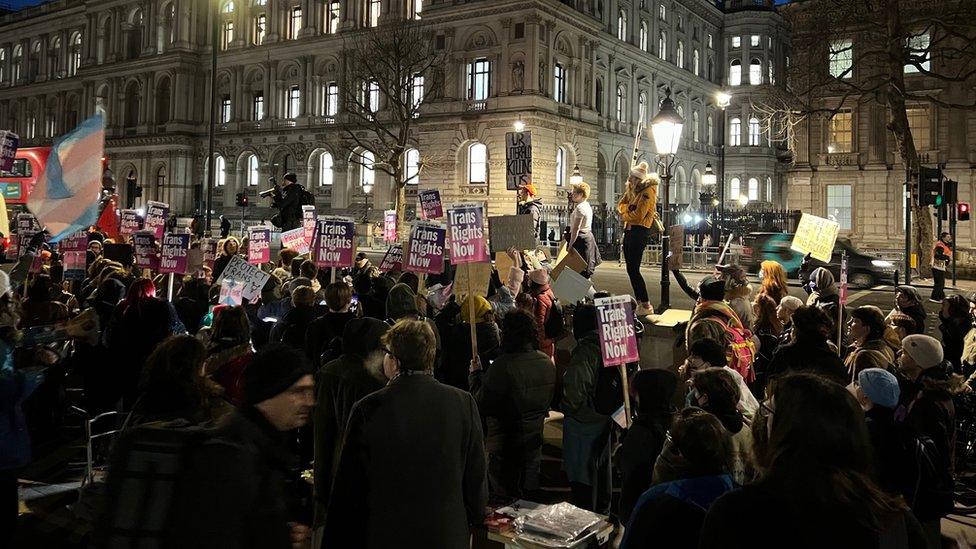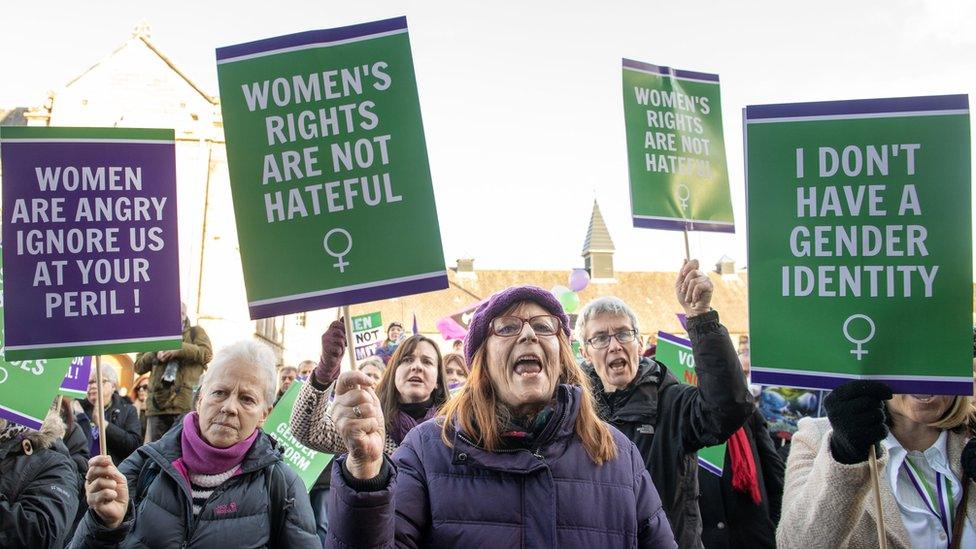Gender row legal challenge likely to fail - judge
- Published
Chance of success in gender law court challenge 'low' - former judge
The Scottish government's chances of winning a legal challenge over the gender reform row are "very low", a former Supreme Court judge has said.
Lord Hope said a UK government document outlining its reasons for blocking the Scottish reforms was "devastating".
And he said Scotland's first minister was risking wasting a lot of time and money by taking the issue to court.
He instead called for both sides to attempt to find compromise "in a much calmer atmosphere".
And he claimed it was "quite wrong" to characterise the UK government's blocking of the bill as an attack on devolution.
The reforms, which are intended to make it easier for trans people to change their legally-recognised sex, were passed by the Scottish Parliament last month.
The UK government is blocking the legislation under what is known as a Section 35 order, arguing that the Scottish legislation would have a detrimental impact on equalities laws that currently apply across Scotland, England and Wales.
It has published a detailed list of reasons, external for the move which sets out areas such as equal pay for women and single-sex spaces that it says could be affected.
The Scottish secretary is able to use a Section 35 to prevent legislation passed by Holyrood from being given royal assent if he believes it would have a detrimental impact on areas reserved to Westminster.
First Minister Nicola Sturgeon has accused the UK government of launching a "full-frontal attack on our democratically-elected Scottish Parliament and its ability to make its own decisions on devolved matters".
She said it would "inevitably" end up in court.

The gender recognition reforms have been among the most controversial pieces of legislation in the history of the Scottish Parliament
Her social justice secretary, Shona Robison, has said she is "very confident" the Bill does not impact on UK legislation, adding: "This is legislation that is completely devolved, it is within the competence of the Scottish Parliament."
Ms Robison also said the UK government was blocking the legislation for political, rather than legal, reasons as "it does not agree with the Bill so it has blocked it".
Speaking to BBC Scotland's The Nine programme, Lord Hope stressed that he was not criticising the objectives of the Bill - but argued that it "opens up a whole series of objections when you look at the modifications it makes to UK law".
The former deputy president of the Supreme Court said the Scottish legislation "most certainly does" impact on the Equality Act 2010 and the existing Gender Recognition Act 2004, which currently apply across Great Britain.
And he said it was difficult to see how a court would not agree that Scottish Secretary Alister Jack had "acted reasonably" in blocking the reforms given the reasons that the government had outlined.
It would therefore be a "mistake" for the Scottish government to go to court, he believes.
Lord Hope said: "It seems to me you're risking a lot of time, as it will take a long time to get to the Supreme Court, and also whether it's a sensible use of public money.
"It is open to question whether it is a wise decision from the prospects of success, which I would think were very low given the detail in the document that has been published".

Nicola Sturgeon said it was "inevitable" that the Scottish government would go to court over the veto
He described the list of reasons published by the UK government as a "devastating document for those who seek to preserve the Bill as it is at the moment".
He said it included areas such as "equal pay, schools, the ability for people registering certificates from overseas to come to Scotland and achieve their registration under our system, which doesn't have the protections that apply to those who go to England to register their certificate".
The former judge said "a lot of changes" would need to be made to the Scottish legislation but it "may be possible to compromise".
The major issues included Scottish applicants for a Gender Recognition Certificate no longer having to provide evidence that they have been living as their acquired gender, while England has a "much tougher system".
Single sex schools
He also said the lowering of the minimum age to 16 raises questions about single sex schools - of which there are very few in Scotland but many more in England.
"That raises real questions in England as to whether they're facing a large number of people coming over the border to a single sex school with a certificate that doesn't have the safeguards which apply under the English system", he said.
The retired Scottish judge added: "I'd have thought the best thing to do would be for people to get round a table in a much calmer atmosphere and see to what extent they can work through the various objections."
Lord Hope also argued that Ms Sturgeon was "quite wrong" to describe the use of a Section 35 order as an attack on devolution.
He said: "This is the first time it has been used because the Scottish Parliament has been very careful not to create the kind of problems created by this particular Bill.

Protesters held a demonstration outside Downing Street against the UK government decision
"It is a section that has been in the settlement since the outset, so it is not destroying devolution at all - it is part of what devolution involves."
However, Labour peer Lord Falconer - a former UK justice secretary - tweeted, external that he did not believe that the "nuclear option" of using a Section 35 was justified by the reasons set out by the UK government.
Scottish Labour, who supported the bill at Holyrood, called on Scottish and UK ministers to find a solution to the impasse.
Its leader, Anas Sarwar, said he believed the use of a Section 35 was the "wrong approach" and was designed to "make this a constitutional fight and a culture war".
He added: "Many of the concerns that still exist with this legislation can be addressed through guidance from the Equalities and Human Rights Commission (EHRC).
"If concerns are raised by the EHRC once they issue that guidance then both governments in good faith should look to address those concerns. That is the sensible way forward".
The Scottish Secretary told MPs on Tuesday that having different gender recognition processes across the UK would create "significant complications" and could lead to "more fraudulent or bad faith applications".
He acknowledged that blocking the legislation was a "significant" step, but insisted it was not one he had taken lightly.
On Wednesday evening, protesters held a demonstration outside Downing Street to voice their opposition to the UK government using Section 35 to block the legislation.
What are the gender reforms?

Opponents of the reforms are concerned about their potential impact on legal protections for women
The Gender Recognition Bill was passed by 86 votes to 39 in the Scottish Parliament last month, and is intended to streamline the process in Scotland for changing someone's legally recognised sex.
The reforms have been highly controversial, with several SNP backbenchers voting against the bill and Ash Regan quitting as Scotland's community safety minister in protest.
The bill would lower the age that people can apply for a gender recognition certificate - a document confirming a change of someone's legal sex - from 18 to 16.
It would also remove the need for a medical diagnosis of gender dysphoria, with applicants only needing to have lived as their acquired sex for three months rather than two years - or six months if they are aged 16 or 17.
Trans campaigners welcomed the reforms, but critics of the plans are worried that allowing anyone to "self-identify" as a woman could affect women's rights and access to single-sex spaces like refuges and changing rooms.